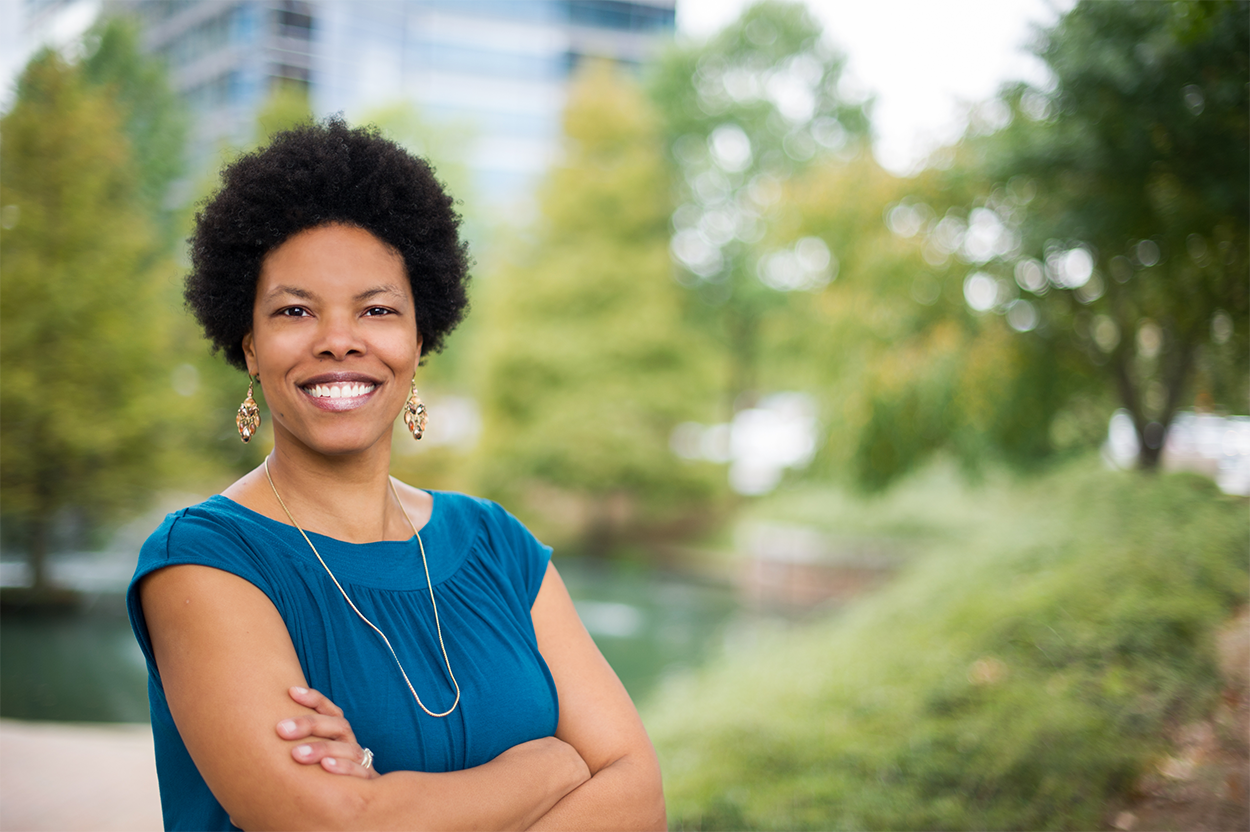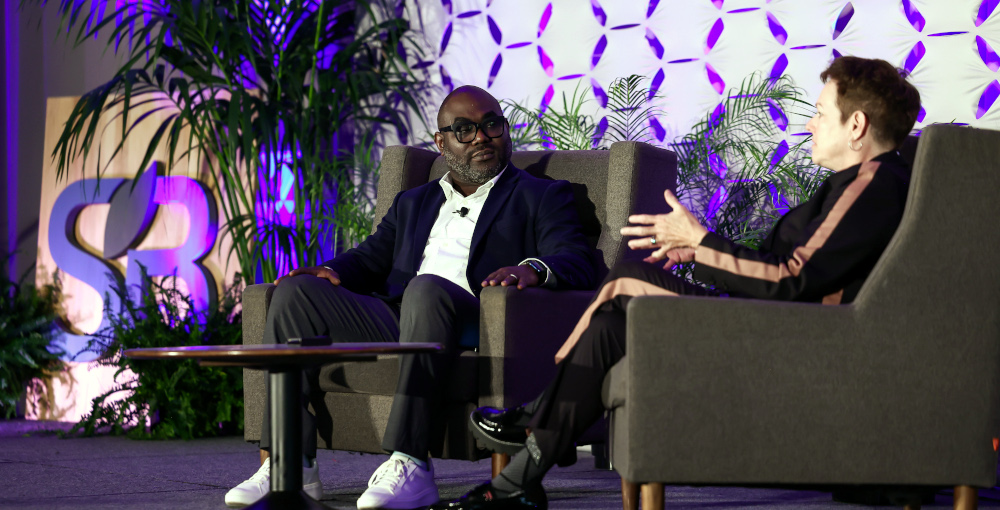In partnership with The BYP Network Ayanna Robinson, Global chief client officer recently discussed her journey within the PR world and specifically as Porter Novelli’s first black female CCO.
Black Role Model Visibility
How do you process/celebrate your accomplishments?
I chose to answer this question because I want to be honest with the fact that I don’t process or celebrate my accomplishments well. As a child, pursuing personal excellence in every aspect of my life was instilled in me. I developed a work ethic that didn’t include stopping to “smell the roses” or celebrating an accomplishment. All I did was set my sights on the next goal and got to work. Unfortunately, I have not made much progress in improving my behavior in this area. In 2020, I was promoted to the role of Chief Client Officer at Porter Novelli. I made it to the C-Suite! As a Black female in this sector, this was a HUGE deal! HUGE!
Nearly 18 months later, I can’t remember what, if anything, I did to truly acknowledge what I accomplished and what that meant to the other professionals of color in the company who could now look at their senior leaders and see someone who reflects them. Each year, I tell myself to take a moment to reflect and celebrate my accomplishments. I must say that I remain a work in progress and will endeavor to do better this year. I probably should set some goals in this area to ensure I actually do it this year! If I were to give advice to my 24-year-old self, I would tell myself that life is short and nothing is promised; celebrate every accomplishment because you put in the work and deserve every accolade and more.
How important is Black role model visibility within the workplace?
I remember the first time I met a Black female SVP when I worked at another global public relations agency. This woman ran the travel and tourism practice and was based in New York. She was beautiful, stylish and wicked smart. I was in awe and wanted to be successful just like her. It took another five years from the time I met her until I met another Black senior executive at Porter Novelli (and I changed jobs twice in between!).
When I joined Porter Novelli, I was so surprised and thrilled to meet Black male senior leaders. Their presence signaled to me that I could actually achieve my goal of becoming a senior leader because others were doing it. Visibility of Black leaders in an organization typically indicates that people of color can have a voice, be accepted and be seen as bringing value to the company. When they are leading revenue generating functions in the business, it signals confidence in business acumen and decision-making abilities which can have a significant impact on the company’s financial success.
That said, we still experience tokenism in the workplace where companies have a Black leader or leader of color who is marginalized or has limited authority to effect change. This can have the opposite impact on retention of employees of color because it is a familiar dynamic and not a positive place for growth and development. As the most senior Black executive at Porter Novelli, I use my seat at the table to advocate for and create opportunities for my colleagues of color and to hold the organization accountable for its goals to increase diversity so I am not the only person of color in the C-suite in the future. I counsel young professionals who are considering a position at a company to look at the top. If you don’t see someone who looks like you, pause and investigate as it may be a signal to what the company values and it may not be a place where you can have a long future.
Career Development
Do you have daily actions you take to help change the Black narrative within or outside your establishment?
Porter Novelli established a senior executive role on the global leadership team to lead DEI many years ago (well before 2020). The CEO, at the time, initially offered me that role because it was a position that I often advocated for him to create to ensure he was receiving counsel from diverse perspectives. When he offered me the role, I turned it down (though it would have been a promotion) because I recognized my super power in my role as leading (at the time) the largest account in the organization.
My power was the ability to have control over the hiring and development of talent and to serve as a senior counselor to clients. Now, that may not sound remarkable in any way but it was. In my role, I hired and cultivated the most diverse team within the company, which was also the fastest growing and most profitable. I was able to create opportunities for the entire team, including several women of color, to be promoted to senior roles in the organization. Our team was known for its award-winning work and spirit of excellence (we literally called ourselves Team #FLAWLESS). We normalized diversity as a characteristic of leadership and success at Porter Novelli.
In addition, I recognized my ability to change perceptions of the business community as to what a senior counselor looked like. Most of our clients were white men and women who had not worked with a senior person of color before, let alone relied on one as a counselor and partner. I remember the first time I walked in with my diverse team to meet our new client and the client spoke first to the older white male consultant with me assuming he was the team leader. While not surprised that it happened, I did work to reorient the client to our roles and then went on to lead a successful kick off meeting. Though it took time, the client and his team members grew to rely on me as the senior counselor and my team to guide them through critical moments in their business. I believe this engagement had a lasting effect on the client and his organization. I often tell people to think about the impact they want to have in their organization and identify their super power to make it happen. Don’t let the perspective of others to keep you from walking in your super power and creating the legacy you want for yourself.
Navigating the Workplace
Did you receive assistance from mentors/senior leadership?
I have always been blessed to have a strong network of mentors and senior leaders who have been willing to invest in my growth and development. I have learned so much about servant leadership, teaching, counseling and building successful, high-performing teams. As professionals, we are often taught to work hard and achieve success. I, too, was encouraged to that in my early years. As I grew professionally and became a manager, I saw that the most successful leaders were not the only stars on their teams. They had recognized the importance of creating other stars within their teams. It dawned on me that in creating new stars the impactI could have on the lives, careers, businesses and communities was magnified. It has become my own professional mantra and one that I push leaders around me to also live by – while it is good to be a star, the true measure of a leader is the person’s ability to create a universe of stars. I see this as a multiplying factor in a business. One star will always be limited in reach and impact, but a universe of stars can light up the world.
As a Black woman, the other two pieces of salient advice I learned from my mentors and senior leaders were to learn /accept my worth and to let my work speak for itself. There were times where I was frustrated with the pace of my advancement and growth within the company. I struggled with why it took longer sometimes for me to move forward. When these moments occurred, I would seek counsel for perspective. I was often encouraged to stay focused, speak my truth and continue to do good work. Ultimately, my work would make room for me. This was at times a hard lesson to learn but I have leaned into it over the years and continue to trust that my work with speak for itself and create opportunities for me. If there was one thing I would do differently in my career, it would be to recognize my worth faster and require people to acknowledge it as well. As I have negotiated for compensation in positions, I have encouraged others to push for their worth and all they could get. I have counseled others to make them tell you no. While savvy for advocating for others, I have yet to take this advice but will do better the next time.
Race Matters
How did the events of last year shape your perception concerning the workforce and diverse talent?
I have always had a personal commitment to and belief in diversity in the workplace. I was blessed to find an organization that believed in it as well, long before the murder of George Floyd in 2020. One of my early managing directors at Porter Novelli stressed the importance of a diverse team and made every effort to demonstrate that belief in the office daily. She taught me the difference between equity and equality even before I had heard the terms used in the business environment.
Today, I remain committed to making Porter Novelli one of the most diverse agencies in public relations. I use my seat at the table to hold myself and the organization accountable to our diversity commitments – ensuring they are more than vanity metrics. I am encouraged to see other businesses remain steadfast in their commitments as well. My initial concern after the summer of 2020 was that leaders would become distracted with the demands of business issues in the midst of COVID and stop the work they had started and walk away from the commitments they had made. Many companies made statements about the importance of equity and diversity, but would they be willing to close their own say – do gap? Many said said they believed in diversity, but their actions and practices didn’t reflect it. Would they put in the work? There is still much to do but the work continues. I hope to see more change in the complexion of the global leadership landscape. Only time will truly tell.
I challenge professionals of color to advocate for others so they are not the only one in the room. Demand opportunities and create space for others to sit at the table, especially if you have the ability to influence who is invited into the room. Don’t forget that someone went before you to a place for you and your responsibility is to continue the work to normalize Black faces in positions of leadership because it makes a difference.

















